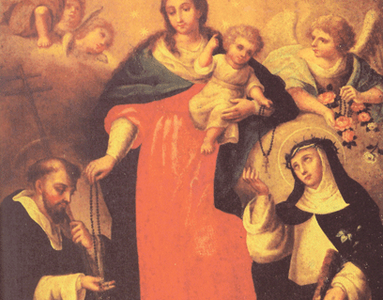The story behind the celebration of Mary under the title “Our Lady of the Rosary” is rather surprising; it is a memorial established in commemoration of the European victory over the Turks in the Battle of Lepanto in 1571, originally named the feast of “Our Lady of Victory.” Despite the title’s martial origins, the history of the rosary itself far predates the Battle of Lepanto.
Tradition tells us that in 1214, Mary came to St. Dominic in a vison and introduced to him the beads of the rosary and their associated prayers, and devotions to it then spread throughout the world, down through the centuries. However, the origins of the prayers themselves date back even farther—long before Dominic’s birth—even prior to the birth of Jesus himself!
When Mary was told by the angel Gabriel that she would conceive and bear a Son, he greeted her with the words that would be recited around the world throughout all future generations: “Hail, full of grace! The Lord is with you” (Lk 1:28). And when Mary left “in haste” to visit her pregnant cousin Elizabeth, at their greeting, Elizabeth proclaims to her, “Blessed are you among women, and blessed is the fruit of your womb” (Lk 1:42). It’s in these moments that these blessed words were spoken, teaching us how to pray millennia later.
Why are the prayers of the rosary particularly important? Were there not plenty of devout Jews praying long before there was a rosary in existence? And are there not plenty of other ways to pray? While this is all true, there is something specifically unique to the rosary that sets it apart from all other forms of prayer.
Without getting into the promises associated with the rosary itself as a devotional, and without getting into the scholarly discussion about how the rosary is a prayerful way to meditate upon the life of Christ outlined in the Scriptures, there is one particularly unique aspect to the rosary that cannot be found with any other prayer, and for this reason, it is our lifeline to the Spirit.
When my mom passed away ten years ago, it came as the result of several long-term medical issues she had endured and was, therefore, somewhat expected. But when any loved one dies, there is always a “shock” at the realization that one will never see that loved one again, at least not on this side of eternity. The sorrow one feels at such loss can make it difficult to eat, to sleep, to read…and even to pray.
I remember seeing my mother lying in the casket—there were no words to be said at that moment, just tears. As I left her side to give others a turn to view her body, I sat down on one of the seats lined against the wall. There was nothing for me to do. It wasn’t like I could ask Jesus to heal her now. Or to bring her back to life as He did for Jairus’ daughter. Even if I thought Jesus would be inclined to grant such a request, deep down I knew that my mom was exactly where she wanted to be now; and in that, I had peace.
So having “nothing” to pray for, and with an emptiness in my heart, I grabbed my rosary and started praying silently. A few Hail Mary’s in, my aunt said to me, “Pray out loud so we can join you.” Pray out loud? I was crying so much I could barely speak. But I did as she requested and began to lead the whole room in a tearful rosary. One by one, everyone joined in, until we were all praying together, in unison, “with one accord” (Acts 1:14). A sweet serenity began to seep into the room and into our hearts. In that moment, I knew my mom was praying with us too.
If we ever wonder whether the rosary is simply a mindless prayer of “vain repetition” (Mt 6:7), let us realize that the only way to pray “of one heart and mind,” as the early believers did (Acts 4:32), is if we are all praying the same thing. That is how the Holy Spirit comes to the aid of our weakness, “for we do not know how to pray as we ought” (Rom. 8:26). He has given us the way to pray as we ought—on a silver platter—by filling Elizabeth with the words and inspiring her to proclaim them loudly, so as to ensure that we would not forget. Then, when we pray as we ought, it is the Spirit Himself who prays in us and through us, addressing our needs in the best possible way, blanketing our souls with His sweet serenity, calming our nerves, and restoring our peace.
By praying the rosary in humble obedience, though perhaps we do not understand how this can be, the Spirit helps us understand interiorly that in the end everything will be okay. The Mother of our Savior is interceding on our behalf, whispering in her Son’s ear: Take care of this. This is what it means to be filled with the Holy Spirit, as Elizabeth herself was on the day of Mary’s arrival. Suddenly, we are filled with a peace and understanding that we did not possess before, one which we have no other way of obtaining.
Finally, Elizabeth ends her proclamation to Mary with some of the most beautiful words we could possibly hear:
Blessed are you who believed that what was spoken to you by the Lord would be fulfilled.
Let’s not just go to Mary for her help and guidance. Let’s strive to be like Mary, too. In the words of Mother Teresa of Calcutta, let’s ask Mary to “lend us her heart,” and in return, let’s give her ours. And then let us believe that what the Lord speaks to our hearts will one day be fulfilled, just as it was for Mary.
Immaculate Conception, Mary my mother, live in me, act in me, speak in me and through me. Think your thoughts in my mind, love through my heart, give me your dispositions and feelings. Teach, lead me and guide me to Jesus. Correct, enlighten and expand my thoughts and behavior. Possess my soul. Take over my entire personality and life, replace it with yourself. Incline me to constant adoration. Pray in me and through me, let me live in you and keep me in this union always.
– Pope John Paul II
de Valdés, L. (c. 1700). La Virgen del Rosario con Santo Domingo y Santa Catalina de Siena [painting]. Retrieved from Wikimedia Commons.












